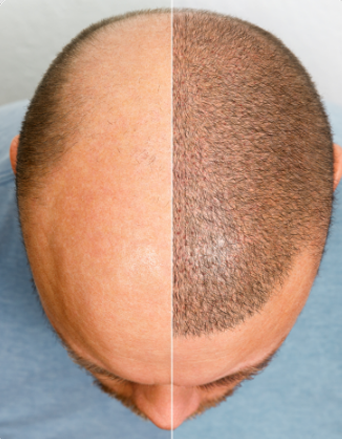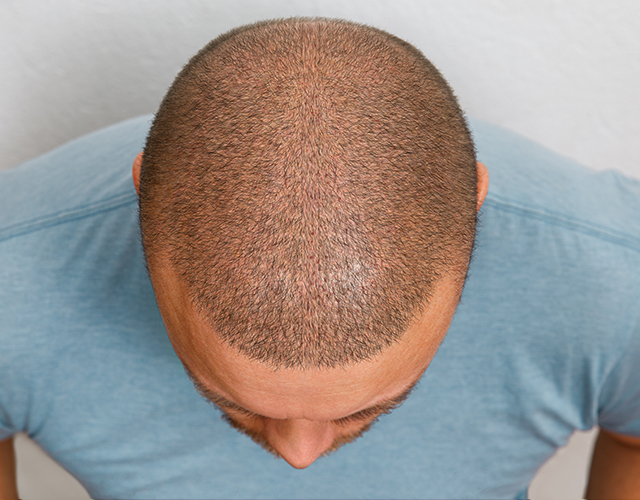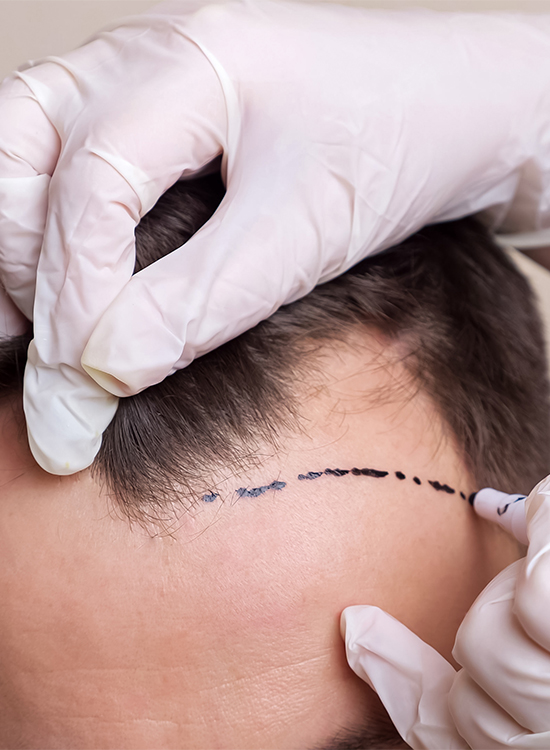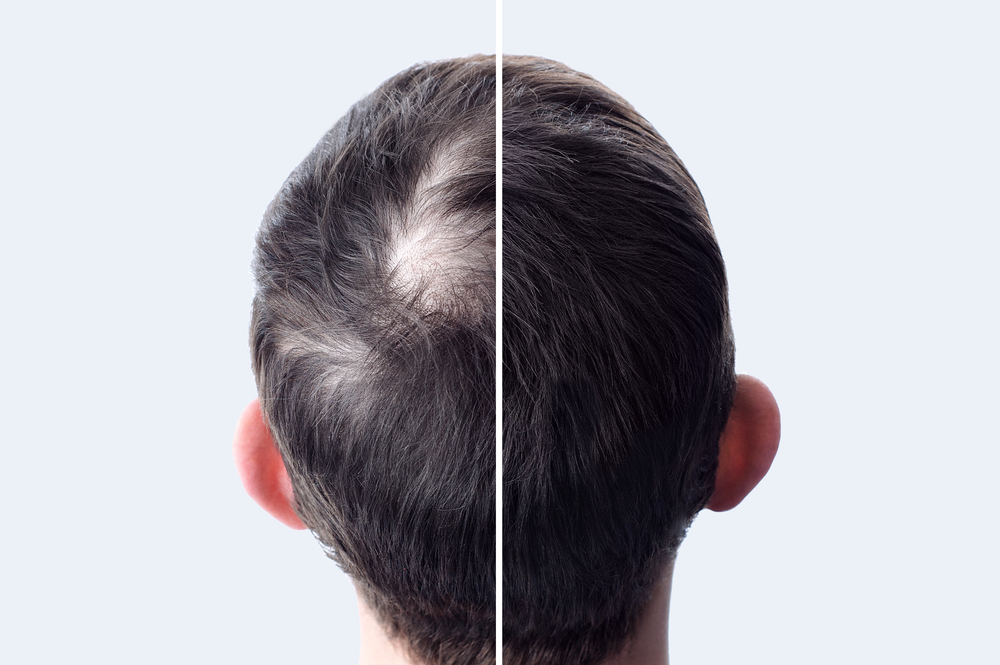Hair Transplant
Unlock the Key to Thicker, Healthier Hair with a Hair Transplant
Hair transplantation is the procedure of removing hair from the donor area and transplanting it to a balding area or an area with insufficient hair. There are various techniques available, but all hair transplants involve taking hair follicles from one area of the scalp and transplanting these follicles with the help of a pen into bald or thinning areas of the scalp or trauma areas.
Common male pattern hair loss, also known as androgenetic alopecia, scalp inflammation, or scalp injury, can cause hair loss. Burns, scalds, surgery, and car accidents can all cause permanent hair loss that can be concealed with a hair transplant. Of course, these are not the only causes of hair loss. If you have prematurely lost your hair and are looking for a permanent solution to your hair loss, you should consider hair transplantation.
When to Get a Hair Transplant?
There is no correct answer to this question because the reason for hair transplantation varies from person to person. Hair loss varies from person to person, and you may require a hair transplant sooner than expected. However, in order for your hair loss to stop and not progress, patients over the age of 30 should have a hair transplant. With a doctor’s consultation, some procedures may be recommended for people under 30.
Hair Transplant in Turkey
Turkey is a popular destination for patients seeking hair transplantation. Hair transplantation in Turkey provides a higher quality service at a lower cost compared to high-cost regions such as Europe and America. At the same time, because Turkey is a tourist destination, patients see our country as a viable option for both vacation and treatment.
With its strong health system, Turkey is one of the leading countries in health tourism. If you are considering having a hair transplant in Turkey, Esvita is the place to be!
How Is Hair Transplant Done?
If you’ve noticed that your hair is thinning and thinning and you’re concerned about it, and you’re looking up how to do hair transplantation on the internet, you’ve come to the right place. Esvita Clinic is here to provide you with the most up-to-date information! If you have decided to have a hair transplant and have chosen us as your provider, we will assist you in achieving healthy hair! Then, in collaboration with your doctor, we will determine the best technique for you and prepare you for the procedure.
Hair transplantation can take up to six hours. Most hair transplants are performed as outpatient procedures with local anesthesia. As a result, you can leave the hospital the same day as your hair transplant. Most patients can rest comfortably at home and go about their normal lives.
However, to provide a general picture of the healing process;
Day 1: The bandages can be removed.
Day 2: You may shampoo your hair.
3-5 days: If you work, you can resume work and begin light sports activities.
After three weeks, you can resume your normal routine and continue exercising and participating in sports.
Naturally, the healing process varies depending on the operation and the individual. Your doctor will inform you about post-hair transplant care in the days following the procedure.
What Are the Benefits of Hair Transplantation?
Hair loss affects 50% of both men and women. Hair transplantation is ideal for men and women who want to look younger and more attractive. Everyone experiences hair loss at some point in their lives and having a hair transplant can improve your appearance and self-confidence. Hair transplantation, regardless of the treatment method you and your doctor choose, significantly improves the following issues:
- Removes hair-related issues
- Makes the hairline appear more natural.
- Enhances your self-esteem and appearance
- It is a painless and scarless procedure.
- Enables your hair to grow more naturally.
What Are the Causes of Hair Loss?
Alopecia, or hair loss, can be temporary or permanent and can affect your scalp or entire body. Genetics, hormonal changes, medical history, stress, and other factors can all contribute to hair loss. Males and females alike can lose their hair, although men are more likely to do so. The majority of hair loss is brought on by pattern baldness. Genetics plays a role in this.
Numerous factors can cause hair loss. These are
- Genetics: If baldness or hair loss runs in your family, this issue may also affect you.
- Nutrition: A poor diet and unhealthy eating habits might impact your hair.
- Stress: The fast-paced lifestyle of the 21st century has caused stress for most people. However, if you cannot control your stress, your body, particularly your hair, may react by losing hair.
- Illness: Hair loss can occur if you have a disease that affects the condition of your hair, such as thyroid, diabetes, ringworm, or ringworm.
- Hormonal imbalance: Along with stress, hormonal imbalances (including pregnancy, menopause, irregular menstruation, rapid weight gain, and loss) can impact your hair’s health.
- Vitamin deficiency: Hair that is vitamin-deficient begins to fall out. Such vitamins include B12, vitamin D, folic acid, biotin, zinc, and iron.
What Are the Techniques of Hair Transplantation? Which Procedures Are Performed?
Hair transplantation techniques vary depending on where the procedure is to be performed. In Turkey, hair transplantation operations are performed using the most advanced technological tools to achieve the best results. There are hair transplant procedures available to meet the needs of each patient. To provide a list of these operation types;
- FUE Hair Transplantation: This procedure involves removing healthy hair follicles from the donor areas on the back and sides of the head using small incisions and transplanting them to the patient’s needing area.
- DHI Hair Transplantation: This technique is based on FUE. DHI hair transplantation is regarded as a relatively new hair transplantation technique. The most significant difference between FUE and DHI hair transplantation is that in DHI hair transplantation, grafts taken from the donor area are transplanted directly to the area of need in hair transplantation performed with the Choi pen technique.
- Beard Transplantation: It is a transplantation procedure performed to restore hair in areas where facial hair is sparse or missing.
- Mustache Transplantation: It is the process of transplanting hair follicles to the areas where no mustache grows on the upper lip in men.
- Eyebrow Transplantation: It is a cosmetic procedure in which hair grafts are transferred to your eyebrow area in order to grow new hair on the eyebrows and achieve a fuller appearance.
Operation Details
| Operation Type | Procedure Duration | Anesthesia | Recovery time |
|---|---|---|---|
| Sapphire FUE | 6-8 hours | Local Anesthesia | 8-9 months |
| the DHI Technique | 8-10 hours | Local Anesthesia | 6-7 months |







 EN
EN IT
IT FR
FR ES
ES DE
DE


